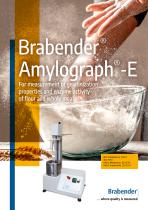
Rotary viscometer Amylograph-Elaboratoryfor flourbenchtop

Add to favorites
Compare this product
Characteristics
- Type
- rotary
- Applications
- laboratory, for flour
- Configuration
- benchtop
Description
The Amylograph-E provides you with a reliable, reproducible picture of enzyme activity (α-amylases) in flours and whole grains. This enables you to make statements on flours’ suitability for baking and control the dosing of, for example, baking malt or enzyme preparations.
Your advantages
• Easy to use
• No enzyme damage before measuring
• Quality control in accordance with international standards
• Gentle heating from 30°C to 93°C
• Comprehensive picture of enzyme activity
• MetaBridge software: user-guided workflows, reference limits, measurement correlations, customizable methods & parameters and much more
• Connectivity: support for third-party solutions (ERP, LIMS)
Optimise baking suitability and dosing: simply, precisely and reliably
The method is characterized by a simple test procedure. The measuring sensor placed directly in the product ensures a precisely adjustable temperature. This increases the reproducibility of your measurement results.
Track the effect of enzymes during the measurement and save costs through optimal control over the dosage of expensive enzymes. Analysis by Amylograph-E gives you precise results that meet international standards.
Principle
In the Amylograph-E, a suspension is heated in a rotating measuring container, at a rate of 1.5°C per minute. The heat rate simulates the process inside a breadcrumb during the baking process.
Depending on the sample’s viscosity, a measuring probe stuck into the sample is deflected into the measuring container. This deflection is measured as a torque value and automatically recorded in the amylogram.
VIDEO
Catalogs
Brabender ® Amylograph®-E
3 Pages
Related Searches
- Automatic test equipment
- Automatic testing system
- Moisture meter
- Viscosity measurement device
- Portable moisture meter
- Laboratory viscometer
- Rheometer
- Rotational viscometer
- Solids moisture meter
- Automated viscometer
- Benchtop viscometer
- Process viscosity meter
- Viscometer for the food industry
- Digital viscometer
- In-line viscosity meter
- Food product moisture meter
- Research and development test equipment
- Film test equipment
- Laboratory rheometer
- Viscometer for the chemical industry
*Prices are pre-tax. They exclude delivery charges and customs duties and do not include additional charges for installation or activation options. Prices are indicative only and may vary by country, with changes to the cost of raw materials and exchange rates.






